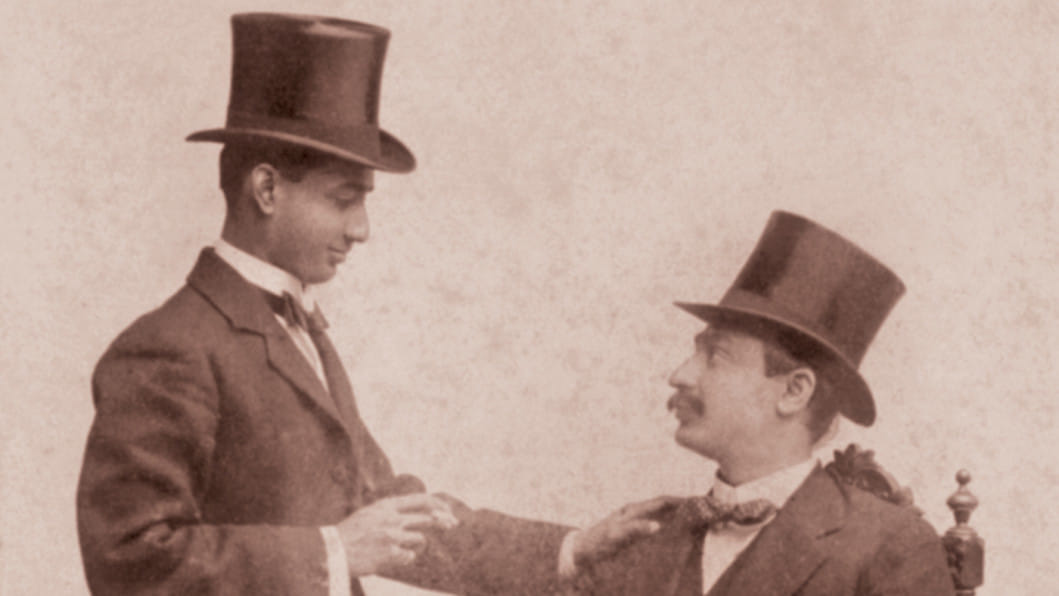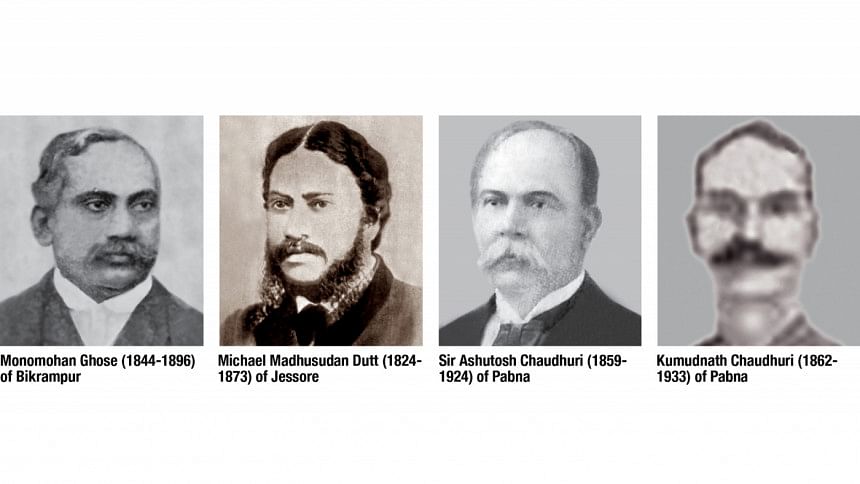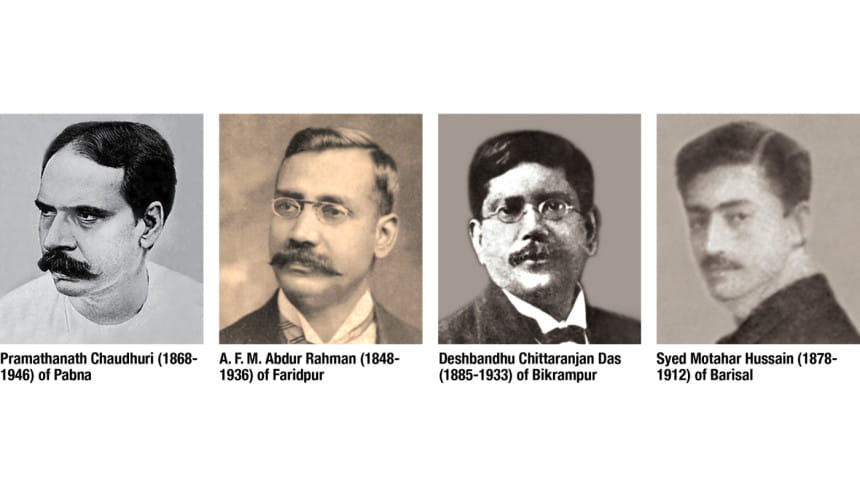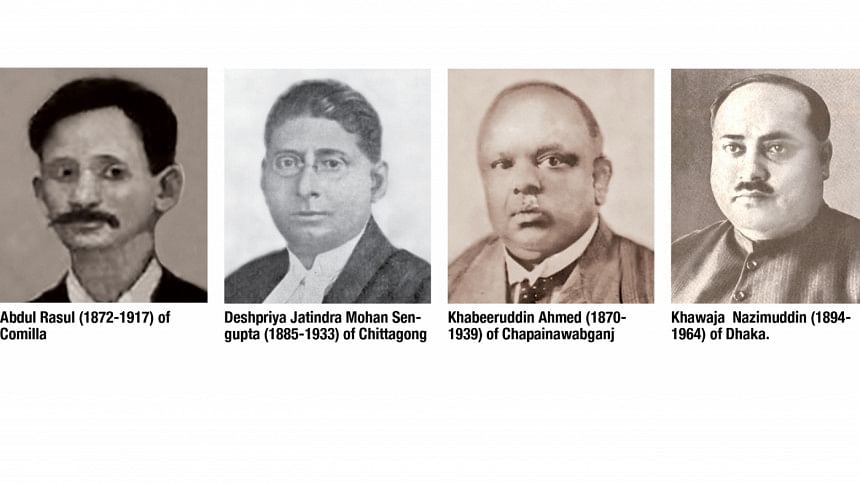Early Barristers from East Bengal

The failed Indian rebellion of 1857 also led to the 'demise' of the rapacious East India Company (EIC) in 1858, when political power was transferred to the crown-in-parliament in England with the founding of 'The British Empire in India' (1858-1947), popularly known today as the British Raj. A deceptive calm settled over the restive land, following savage Company (EIC) reprisals with the fall of rebel held Mughal Delhi, Lucknow and elsewhere in upper India. As colonial India gradually came under the firm vice-grip of the inglorious British Raj, Queen Victoria (reign: 1837-1901) was proclaimed as 'Kaiser-i-Hind' or Empress of India in 1877, in the plains of Delhi in a grand durbar held under the aegis of the Earl of Lytton, the Viceroy and Governor-General of British India.
Meanwhile, as life returned to normal, educational institutions at the college and university level in the Bengal Presidency, experienced an efflorescence of academic excellence achieved by Indian students profoundly impacted by the Bengal Renaissance, necessitating further advanced education in the fields of the sciences, liberal arts and law through enrollment in institutions of higher learning in Britain. In the meantime, the opportune opening of the Suez Canal in 1869 considerably reduced the distance, time and cost of travelling between India and Britain. Also, the rapid modernization of steamship navigation via the high seas, encouraged more aspiring Indian students to travel in relative comfort to attend prestigious colleges and universities in Britain, thereby obtaining higher degrees to qualify in the professions of law, civil service (ICS), medical science, engineering, financial management and in other areas of human endeavor. Thus, the Indian Barristers in particular, started to return to India adequately 'armed' with newly acquired legal skills, determined to face the forbidding challenges of a colonial society with boldness, hitherto unknown. Gradually, a new era of political consciousness and nationalism dawned in British India in which the Indian Barristers played a leading role, many of whom entered politics as ardent nationalists, devout revolutionaries and prominent politicians to challenge the British Raj as formidable opponents. The rest is history.



This essay is dedicated to the early Barristers from East Bengal, the 'Bhumiputra' or 'son of the soil' who qualified for the prestigious legal profession in those difficult days by becoming successful trailblazers for future generations of aspiring Barristers, as they followed in their footsteps during the colonial era. The period covered here is from 1866 to 1920. It began when Monomohan Ghose (1844-1896) from historic Bikrampur of Dhaka, was called to the Bar in London in 1866. While Gnanedramohan Tagore (1826-1890) from the Pathuriaghata branch of the Tagore family in Calcutta was the first Indian and Asian to qualify as a Barrister in 1862, Monomohan Ghose became the first 'practicing' Indian Barrister by joining the Calcutta High Court in 1886.
The following is a list of early Indian Barristers presumably from the Bengal presidency, who were mandatorily required to belong to one of the four learned Societies, that is, the 'Inns of Court' namely: Lincoln's Inn, Gray's Inn, Inner Temple and Middle Temple in London, England to qualify at the Bar. Provided against the names for most of the following Barristers are the dates, when they were called to the Bar. Only the identifiable Barristers from East Bengal are shown within the parentheses of (EB): Monomohan Ghose - 6 June, 1866 (EB); Michael Madhushudan Dutt- 17 Nov, 1866 (EB); Womesh Chandra Bonnerjee (also Umesh Chandra Banerjee) - 11 June, 1867; Syed Ahmed Ali - 26 Jan, 1869; Tarokanath Palit-10 June, 1870; Romesh Chandra Dutt -6 June, 1871; Biharilal Gupta- 6 June,1871; Rajnarain Mitra- 6 June, 1872; Syed Asghar Ali Khan-11 Jan, 1873; Syed Ameer Ali – 27 Jan, 1873; Krishnamohan Chatterjee- 27 Jan, 1873; Lalmohan Ghose- 7 June, 1873; Charu Chandra Dutt-24 Jan, 1874; R. K. Sen-24 Jan, 1874; Anandamohan Basu- 3 April, 1874; Brajendranth De – 1875; Pramathanath Mitra-26 Jan, 1875; Manath Chandra Mullick- 7 June, 1875; Bipin Bihari Mukherjee - 11 June, 1875; Nagendra Ghose-28 June, 1876; Girish Sen- 28 June, 1876; A. C. Mitra - 28 June, 1876; R. Ghose - 17 Nov, 1876; Nandalal De-17 Nov, 1876; Jogendranath Sarkar- 13 Jan, 1877; A.C.Rudra- 13 June, 1877; Rishibar Mukhapadhaya- 27 Jan, 1879; N. Halder-27 Jan, 1879; W. M. Das– 27 Jan, 1879; W.C. Ghose-27 Jan, 1879; Pearylal Rai- 21 April, 1880; Mohammad Sirajuddin - 21 April, 1880; A. Hossain - 21 April, 1880; Abdul Halim - 21 April, 1880; A.F.M. Abdur Rahman - 21 April, 1880 (EB); Syed Abdur Rahman - 9 June, 1880; Syed Mohammad Sharfuddin - 9 June 1880, Syed Nurul Huda - 9 June, 1880; K. N. Mitra- 10 June, 1880; Ashutosh Chaudhuri– 1886 (EB); Kumudnath Chaudhuri – 1889 (EB); Chittaranjan Das- 1894 (EB); Atul Prasad Sen - 1894 (EB); Jogesh Chandra Chaudhuri-28 Jan, 1895 (EB); Pramathanath Chaudhuri- 1896 (EB); Abdul/Abdur Rasul-1898 (EB); Syed Motahar Hussain–1903(EB); Amiya Nath Chaudhuri-1904 (EB); Jatindra Mohan Sengupta – 1909 (EB); Khabeeruddin Ahmed – 1910 (EB); Ashraf Ali Khan Chowdhury – 1912 (EB); A.S.M. Latifur Rahman-1914 (EB) and Khawaja M. Nazimuddin – 1920 (EB).
Note: Some of the unidentifiable Barristers, especially those with Muslim names as shown in the list in the batch of 1880, and elsewhere may also have belonged to the presidencies of Madras, Bombay or other places in British India, like upper India. Since the focus of this essay is exclusively on Barristers from East Bengal, some Barristers with Hindu Bengali names as mentioned above from the Bengal presidency may have hailed from West Bengal, too. It was not possible to come by detailed information on them. Moreover, it is very intriguing to note that in the year 1880 alone nine Indians qualified as Barristers, a record number for a particular year of whom curiously seven were Muslims and only two Hindus. This is rather unique for the times and need further research to learn as to how so many Indian Muslims managed to qualify at the Bar in 1880, during the heyday of the Victorian era?
Now a brief mention of the identifiable early Barristers from East Bengal (EB) for the stated period. Monomohan Ghose, was born in historic Bikrampur in Bangladesh. He joined Lincoln's Inn and was called to the Bar in 1866. As already mentioned, he was the first 'practicing' Indian Barrister of the Calcutta High Court. Michael Madusudan Dutt hailed from the zamindar family of Sagarderi, in Jessore district. Although, a non-practicing Barrister for most of his active life, he is better remembered as a great poet, writer and playwright/dramatist of the Bengali literary heritage. A.F.M. Abdur Rahman was the eldest son of the eminent Nawab Abdul Latif of Boalmari, Fardipur. He practiced at the Calcutta High Court and was later invested with the title of Nawab. Deshbandhu C. R. Das needs no introduction, particularly in Bengal. He hailed from Bikrampur, Dhaka. He remains a larger than life illustrious figure as an ardent Indian nationalist- revolutionary, politician and a formidable lawyer. Abdul/Abdur Rasul hailed from the village of Guniauk formerly in Comilla now in the Brahmanbaria district. He was a high-profile secular Indian nationalist lawyer of the Calcutta High Court who vehemently opposed Curzon's Partition of Bengal in 1905. He had a distinguished academic record from England. He had an English wife. Syed Motahar Hossain, was born in the Shaistabad zamindar family of Barisal. Very little is known about him beyond the fact that he was a Barrister and the son of Nawab Syed Moazzem Hossain (1810-1909) of Shaistabad, Barisal. He died at a relatively young age. A.S.M. Latifur Rahman was the son of the Calcutta based Barrister Nawab A. F.M. Abdur Rahman of Boalmari , Faridpur. He was a judge at the 'Court of Small Causes' in Calcutta. Ashraf Ali Khan Chowdhury hailed from a notable zamindar family known as the 'Khan Chowdhurys' of Natore, Rajshahi. He practiced at the Calcutta High Court. Deshpriya Jatindra Mohan Sengupta of village Barama, Chittagong, was a Cambridge educated Barrister and a devout Indian nationalist revolutionary and a lawyer-politician in British India. He along with his devoted English wife, Nellie Sengupta, also a politician became household names in Bengal for their diehard nationalist activities. Jatindra died in a British jail in Ranchi due to serious health problems as a result of frequent incarcerations, for his relentless political activism against British rule. Sir Khawaja M. Nazimuddin was a member of the Dhaka Nawab family. He attended Cambridge University and was called to the Bar from Middle Temple in 1920. He became a notable politician and held important public offices in Bengal during the British Raj and more so, after the partition of 1947, in Pakistan.
I take this opportunity to highlight the story of a remarkable zamindar family from Haripur, now in the Chatmohar Upazila, in the district of Pabna, Bangladesh. This particular family was not only noteworthy for being prominent landholders, but more so because of their meritorious scholastic achievements and contribution in the fields of law, Bengali literature and cultural heritage. They were closely associated by marriage and cultural ties to the fabled Tagore's of Jorashanko, Calcutta. We begin with Durgadas Chaudhuri, a notable Brahmin zamindar of Pabna and father of the illustrious 'Chaudhuri brothers.' He married Sukumari Debi a sister of Rabindranath. It is alleged that Dugadas once paid a courtesy call on the English Collector of Pabna, who thought he had come to petition him for a job for his son. Thus, humiliated Durgadas resolved to send his older sons to England to become Barristers. It was the only elite profession in British India where an Indian Barrister could enjoy professional autonomy while in service, and one that did not require an Indian to kowtow to the colonial administration like in the other services, including the prestigious Imperial/Indian Civil Service (ICS). Durgadas and Sukumari had seven sons, five of whom eventually became barristers. They were: Barrister Sir Ashutosh Chaudhuri (1859- 1924); Barrister Jogesh Chandra Chaudhuri; Barrister Kumudnath Chaudhuri (1862-1933), Barrister Pramathanath Chaudhuri (1868-1946), Capt. Manamatha Nath Chaudhuri, Dr. Suhrid Nath Chaudhuri and Barrister Amiya Nath Chaudhuri (1868-1946). The illustrious Chaudhuri's of Pabna from East Bengal (Bangladesh), not only distinguished themselves by producing 'five brothers' (siblings) of the same family who became contemporary Barristers between the years 1886-1904 in the Bengal presidency, but also held that enviable distinction in entire British India during that period! We should take note of this exemplary feat of achievement and take legitimate pride in it as Bangladeshis.
Barrister Sir Ashutosh Chaudhuri (1859-1924) of Pabna, East Bengal, was a lawyer of the Calcutta High Court from 1912-1920. He is readily confused with his namesake, Sir Ashutosh Mukherjee (1864-1924) of Hooghly, West Bengal, another stalwart of Bengal who although not a Barrister was nonetheless, a famous lawyer of the Calcutta High Court and Vice Chancellor of Calcutta University. Incidentally, both the Ashutoshes died in 1924, adding to the prevailing confusion. Sir Ashutosh Chaudhuri, was educated at the Presidency College, Calcutta and at St. John's College, Cambridge, England from where he took his Tripos in 1885, and was called to the Bar in 1886. He married Probita Debi, daughter of Hemendranath Tagore the brother of Rabindranath. Sir Ashutosh was knighted in 1920. He was the Founder Secretary, of the Bengal Landholder's Association a formidable guild during the Raj. For a while he was also a member of the Bengal Legislative Association, the deputy chair of the Bangiya Sahitya Parishad and president of the Calcutta Club in 1915. His younger brother, Barrister Kumudnath Chaudhuri (1862-1933), was a renowned big game hunter who lost his life to a fatal tiger attack during a hunt in the forest of central India. Another younger brother of Sir Ashutosh was Barrister Jogesh Chandra Chaudhuri who graduated from Oxford and qualified at the Bar in 1895. He married Sarasibala the daughter of the famous Indian nationalist, founding member of the Indian National Congress and a leading politician Sir Surendranath Bannerjee (1848-1925). Another sibling of Sir Ashutosh was Barrister Pramathanath Chaudhuri (1868-1946), popularly known as Pramatha Chaudhuri whose nom-de-plume was 'Birbal'. He was a major influential writer of Bengali literature of the 20th century, and a nephew of Rabindranath who was his maternal uncle. Pramatha was married to Indira Debi daughter of Satyendranath Tagore (1842-1923), the first Indian ICS (1863) and elder brother of Rabindranath. He received his MA in English from the Presidency College, Calcutta and stood first class first. He was called to the Bar from Inner Temple, London, in 1896. As a Barrister, he practiced at the Calcutta High Court. However, he did not take the legal profession seriously, since he was more inclined towards the pursuit of Bengali literature which was of foremost interest to him and his actual forte. His devotion and excellence as an eminent Bengali litterateur made him a renowned figure during the last forty years of his literary life.
The last of the distinguished Chaudhuri brothers to become a Barrister was, Amiya Nath Chaudhuri, popularly known as A. N. Chaudhuri. He received a law degree from Cambridge and was called to the Bar in 1904. While his eldest brother, Sir Ashutosh Chaudhuri, the well-known Barrister was a staunch nationalist, Amiya on the other hand was an inveterate Anglophile who along with his westernized spouse loved the excitement and gaiety of high life. They were very popular socialites of the early 20th century glitterati society of colonial Calcutta, thereby belonging to those exclusive social circles where European businessmen and British officials dominated. Amiya was married to Millie, daughter of the eminent Barrister Sir Womesh Chandra Bonnerjee (1844-1906), who was the first president of the Indian National Congress. Millie Chaudhuri (nee Bonnerjee) had the rare distinction in Calcutta of her time for being educated at the Sorbonne in Paris. Their son, Jayanto Nath Chaudhuri (1908-1982), passed out from the renowned Royal Military Academy at Sandhurst, England, where Ayub Khan (1907-1974) later on president of Pakistan was his batch-mate. Both Jayanto and Ayub, became King's Commissioned Indian Officers (KCIOs) in 1928, and joined the British Indian Army. Later on, Jayanto alias 'Mucchu' went on to become the first Bengali and the sixth Indian C-in-C of the Indian Army (1963-1966) in independent India. It is somewhat ironic that both former Sandhurst graduates who had served together in the British Indian army, finally fought against each other to a standstill in the Indo-Pak war of 1965, Ayub Khan as the Pakistani president and thus the C-in-C of his armed forces and General Jayanto Nath Chaudhuri OBE, as the C-in-C of the Indian Army.
It should also be recalled here, that there were two other extraordinary families from East Bengal (Bangladesh) in British India, who had the enviable distinction for having produced three brothers from each family, who became contemporary barristers. They were the sons of Durga Mohan Das who hailed from a well-known Baidya family of Bikrampur, Dhaka. His Barrister sons were: Satyaranjan, Satishranjan and Sudhiranjan. Likewise, three sons of Durga Mohan's younger brother Bhuban Mohan Das, who also became Barristers were: Chittaranjan (Deshbandhu), Prafularanjan and Basanta Kumar. Barrister Atul Prasad Sen (1871-1934) the phenomenal Bengali composer, lyricist, singer and litterateur also hailed from Bikrampur. Born in old Dhaka, he was closely related to the Das family and was called to the Bar in England in 1895.
This article should be read in the context of the times. It is explicitly written with our younger generation in mind for dissemination of information regarding a long-forgotten chapter in the early days of higher education particularly in law, studied in England by adventurous Indian students during the mid-19th and early 20th centuries. I hope that this modest effort will imbue future researchers to delve into newer sources of information on this subject and write more substantially, by way of documentation and historical narration. So much remains to be known about the difficult path traversed by the early pioneering Barristers from East Bengal, who qualified by sheer dint of merit against all odds to become valued members of a once exclusive guild and coveted legal profession. It should be recalled here with gratitude that in an all India basis, it was ultimately the Bengali Barristers who played a pivotal role in humbling the British Raj, thereby bringing it down!
Through this essay, I would like to make a fervent appeal to the Department of Archeology, Ministry of Cultural Affairs (Bangladesh), the District Council of Pabna and the Pabna Bar Association to take urgent steps to preserve the remnants of the historic Chaudhuri zamindar house in Haripur, Pabna, by initiating a well-coordinated action plan to reclaim the lost property. A complete survey should also be undertaken forthwith to demarcate the property and renovate the zamindar house with the assistance of the Department of Archeology. A befitting museum and library should also be set up in the memory of a great son of the soil, the outstanding Bengali litterateur Pramatha Chaudhuri. It will be a laudable step towards the preservation of our cultural heritage and, thereby facilitate tourism.
Waqar A Khan is the Founder of Bangladesh Forum for Heritage Studies.

 For all latest news, follow The Daily Star's Google News channel.
For all latest news, follow The Daily Star's Google News channel. 



Comments